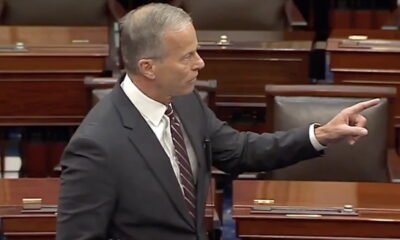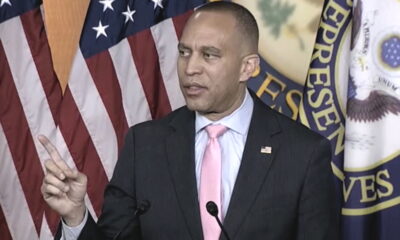Our Journey through the Fifth Circuit Court of Appeals
The last time we went to court back in June of 2014, I took you on a journey inside the Federal Courthouse with us. Today I’d like to take you with us on a historic journey inside the Fifth Circuit Court of Appeals as we present our case to the three judge panel allotted to hear our arguments.
Our morning started really early – at 5:30 A.M. – with Courtney and Nadine Blanchard, the other plaintiffs in our case, (photo below right) picking us up from our home, which is located in a neighborhood roughly two miles from the courthouse. We were instructed by the court to meet the clerk at 7:00 A.M. outside a side door entrance of the John Minor Wisdom Building that houses the United States Court of Appeals for the Fifth Circuit, to be escorted inside. Â
It was a very cold morning, one that we are not accustomed to here in the south, and as we passed in front of the public entrance, people were bundled up already in line, since seats were limited for the “show” that was about to ensue. The line had already formed. A few hours later it would be down the block.
The people gathered there were not just from Louisiana, but had traveled from all over. Like Brandiilyne Dear and Susan Mangum who run The Dandelion Project out of Laurel, Mississippi, and Diana Farrar and Charlotte Moellering from Texas. They stood in line in unfavorable weather, to partake in this historic day.Â
 We were ushered in to our reserved front seats. Our Louisiana case was the first scheduled on the calendar. We sat patiently for two hours, waiting for our case to start, holding small talk with all our co-plaintiffs and our legal team that was in place for the first case.
We were ushered in to our reserved front seats. Our Louisiana case was the first scheduled on the calendar. We sat patiently for two hours, waiting for our case to start, holding small talk with all our co-plaintiffs and our legal team that was in place for the first case.
Finally the judges filed in to their seats, Judge Jerry Smith in the center, with Judge James Graves Jr. to his left and Judge Patrick Higginbotham to his right. Having taken an off the wall beating in Judge Martin Feldman’s ruling in District Court, I was eager to hear what these judges had to say. Â
Our side went first. The judges were quiet for the most part and let our attorney, Camilla Taylor, present our case almost uninterruptedly. Judge Smith broke in a few times and followed an expected line of questioning. But for the most part we were able to go unrestricted in our allotted 30 minutes.
Next up was attorney Kyle Duncan, who represents the state of Louisiana and is funded by Louisiana taxpayer money, earning over $200,000 last year to defend the state, but I’ll talk about that in a another article. The state presented their defense of the Louisiana marriage ban, using the same argument that they presented at the lower court level, which Judge Martin Feldman had found sympathetic. What they weren’t prepared for was the criticism that would come from Judge Higginbotham and Judge Graves.
Just minutes into the states arguments Judge Higginbotham presented this question, “Sexual orientation is an immutable characteristic … but it does not come with any disability, there is no suggestion that sexual orientation has any relevance to the ability to perform. … so now you have a classifier of that order. What is the justification for using that as a classifier by state? … what do you point to as the rational support for the state to differentiate on that classifier?†and when the state got around to the procreation argument he went on – “Back to procreation where we started, and the counter argument to that, of course, is yes, if that really is the basis, why is marriage quickly extended to people who are sterile?â€
Judge Higginbotham wasn’t alone in poking holes in the states argument, he was joined by Judge Graves, who at one point asked, in reference to states idea that marriage is for procreation between a man and a woman, “Council, help me understand how those purposes are frustrated if same-sex couples are allowed to marry.” When state resorted back to United States vs Winsor, relying heavily on just a small portion of the ruling and ignoring the majority of it arguing that Windsor was solely about states’ rights, Judge Graves reminded them,“There’s other language in Windsor that you have to deal with; for example, the statement that the differentiation demeans the couple whose moral and sexual choices the constitution protects….that’s pretty broad language regarding the specific choice that’s involved here.”
After our portion was over some reporters were quick to assume that we may have a favorable ruling based on the Louisiana arguments alone. But it didn’t stop there, the bombardment kept coming with consistency case after case.Â
We were shuffled out of the courtroom and into an overflow room where next we heard arguments from the Mississippi case lead by Robbie Kaplan on behalf of The Campaign for Southern Equality and their plaintiffs Joce Pritchett, Carla Webb, Becky Bickett, and Andrea Sanders.  We sat in anticipation, I wanted to see if the line of questioning that I had just heard would continue, to make sure I didn’t have to pinch myself to see if I was dreaming. And so it did – The state of Mississippi started off with their defense and the questions ensued. In reference to the states argument that the ban was put in place by democratic process and as people change it could be replaced by the people and not changed by the courts. Higginbotham wasn’t buying it – “Those words, ‘Will Mississippi change its mind?’ have resonated in these halls before.â€
Ms. Kaplan was up next, presenting the plaintiffs side with poise and strength that left me in awe, much like she did at the United State Supreme Court in Windsor. The judges even jokingly at one point made a reference to Windsor and said “You may be familiar with this case.†To which Kaplan replied, “I’ve heard of it.â€
Next up was Texas with plaintiffs Cleopatra DeLeon, Nicole Dimetman, Vic Holmes, and Marc Phariss, but they fared no better. The state again took brutal criticism for their procreation and “benefit†argument. Judge Graves asked, “So there are benefits that flow from the right to marry, and the state can choose whether to confer or withhold the benefits. But that doesn’t justify the altogether denial of the right, does it?†and when state used a “free lunch for the poor, but not the middle class and the wealthy†argument Graves continued, “I’m not denying you the right to eat lunch, I’m just telling you I’m not going to pay for it. But in this instance, you’re saying, not only am I not going to confer any of the benefits of marriage, I’m going to deny you the right to marry.†to which the state was shaken.Â
Judge Graves wasn’t the only one critical of the state’s position, Judge Higginbotham joined in, asking:
“Marriage between same-sex couples has no consequences, then, other than the use of the state’s resources. … Your reason is that they just do not want to support this particular process here. Not because it would harm anyone, but because it just does not want to spend its money on this. … Is that it? Â
So you can see why we are  – and I’ve said this before – “Cautiously Optimistic†about this line of questioning today and why we believe that we may have a favorable ruling at the Fifth Circuit, the most conservative appeals court in this nation. While you can never know how a judge will rule based on his questioning alone, we are very hopeful they will rule in consistency with their skepticism of the arguments that were presented by each of the states. Â
We left the courthouse very positive, we gathered just mere feet from the courthouse that afternoon where we socialized with our colleagues letting our hair down after this long day. The atmosphere was electrifying and positive, and we enjoyed it!
 While we may not know the court’s decision for some weeks or even months, today, as I sit here still in shock over what potentially could happen for my family and countless families across these three great states; I know also know this: the decision of the Fifth Circuit is just one piece of a larger puzzle that’s completed at the Supreme Court. But for today, I’m going feel good about this, after being humiliated and demeaned in District Court by Judge Feldman’s archaic thought process in his ruling, I am going to put my faith and money in the WIN column, even if it is cautiously.
While we may not know the court’s decision for some weeks or even months, today, as I sit here still in shock over what potentially could happen for my family and countless families across these three great states; I know also know this: the decision of the Fifth Circuit is just one piece of a larger puzzle that’s completed at the Supreme Court. But for today, I’m going feel good about this, after being humiliated and demeaned in District Court by Judge Feldman’s archaic thought process in his ruling, I am going to put my faith and money in the WIN column, even if it is cautiously.
Keep up with what we are doing here in Louisiana by liking our Facebook and visiting our website. You can also find the Forum For Equality website here, they are a great local organization who is fighting hard on behalf of same-sex couples all across the state.
Together with Lambda Legal at the helm, we will WIN the freedom to marry, it’s what is right and just.
Â
 Derek Penton-Robicheaux, 37, is a native of Mississippi and a longtime resident of New Orleans. Â He holds degrees in computer information systems and paramedicine. Â After more than five years together, Derek and his husband, Jonathan Penton-Robicheaux, were legally married in Iowa on Sept. 23, 2012. The two are the first plaintiffs involved in the Federal Same-Sex Marriage Lawsuit in Louisiana, Robicheaux et al. v Caldwell.
Derek Penton-Robicheaux, 37, is a native of Mississippi and a longtime resident of New Orleans. Â He holds degrees in computer information systems and paramedicine. Â After more than five years together, Derek and his husband, Jonathan Penton-Robicheaux, were legally married in Iowa on Sept. 23, 2012. The two are the first plaintiffs involved in the Federal Same-Sex Marriage Lawsuit in Louisiana, Robicheaux et al. v Caldwell.
Â
Â
Â
Â
Â
Feature Photo from nola.com
Â
Â

Enjoy this piece?
… then let us make a small request. The New Civil Rights Movement depends on readers like you to meet our ongoing expenses and continue producing quality progressive journalism. Three Silicon Valley giants consume 70 percent of all online advertising dollars, so we need your help to continue doing what we do.
NCRM is independent. You won’t find mainstream media bias here. From unflinching coverage of religious extremism, to spotlighting efforts to roll back our rights, NCRM continues to speak truth to power. America needs independent voices like NCRM to be sure no one is forgotten.
Every reader contribution, whatever the amount, makes a tremendous difference. Help ensure NCRM remains independent long into the future. Support progressive journalism with a one-time contribution to NCRM, or click here to become a subscriber. Thank you. Click here to donate by check.
 |























